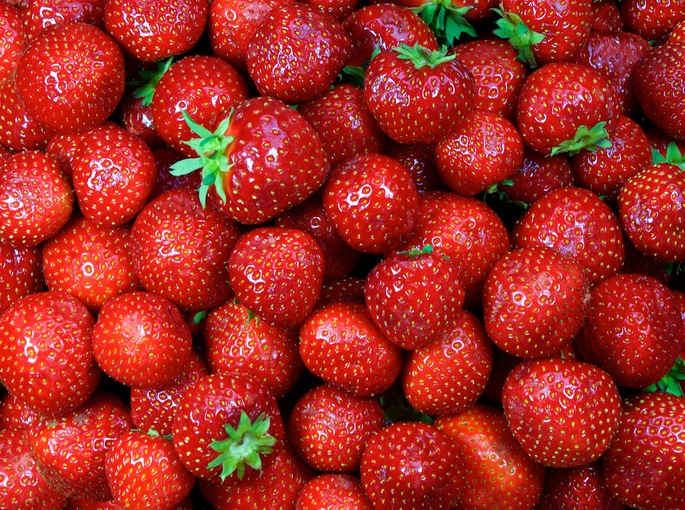
Eating your fruits and veggies every day to improve overall health need not be a chore or even unsatisfying, as investigators from the University of Massachusetts (UMass), Amherst have discovered that consuming a little less than a cup of strawberries could mitigate colonic inflammation and improve gut health. Findings from the new study will be presented at the 256th National Meeting and Exposition of the American Chemical Society through an article titled “Dietary intake of the whole strawberry inhibited colonic inflammation, restored immune homeostasis and alleviated gut microbiota dysbiosis in dextran sulfate sodium-treated mice.”
The UMass researchers were interested in the berry’s effect on gut health and inflammation associated with inflammatory bowel diseases (IBD) such as Crohn’s and ulcerative colitis. In 2015, three million adults in the U.S. reported being diagnosed with IBD, according to the U.S. Centers for Disease Control and Prevention. IBD includes both Crohn's disease, which can infect any part of the gastrointestinal tract, and ulcerative colitis, which is characterized by inflammation of the colon and rectum. People with IBD also have a higher risk of colorectal cancer.
“The sedentary lifestyle and dietary habits of many people in this country—high-sugar, high-animal-fat, but low-fiber diets—may promote colonic inflammation and increase the risk of IBD,” explains senior study investigator Hang Xiao, Ph.D., professor of food science at UMass Amherst.
Dietary consumption of fruits and vegetables has been associated with a lowered risk of IBD. To establish an effective and practical approach to decrease colonic inflammation in both IBD patients and the general population, the UMass team focused on strawberries due to their wide consumption. Most of the previous reports focused on the effects of purified compounds and extracts from strawberries.
“When you only test the purified compounds and extracts, you miss out on a lot of other important components in the berries, such as dietary fiber, as well as phenolic compounds bound to the fibers, that can't be extracted by solvents,” notes lead study investigator Yanhui Han, a doctoral candidate in Dr. Xiao’s laboratory. Han says that it makes sense to study the effects of whole berries because people mostly consume the whole fruits rather than their extracts.
In their experiments, the researchers used four groups of mice—a group of healthy mice consuming a regular diet, and three groups of mice with IBD consuming a regular diet, a diet with 2.5% whole strawberry powder or a diet with 5% whole strawberry powder. Dr. Xiao says they tried to feed the mice doses of strawberries that would be in line with what a human could reasonably consume.
“This study determined the protective effects of dietary intake of whole strawberry (WS) against dextran sulfate sodium (DSS)-induced colitis in mice,” the authors wrote. “Our results demonstrated that dietary WS reduced the disease activity index (DAI), prevented the colon shortening and spleen enlargement, and alleviated the histological damages on colonic tissues in the colitic mice. The abundance of pro-inflammatory immune cells was reduced by dietary WS in the colonic mucosa, which was accompanied by the suppression of abnormal overproduction of pro-inflammatory cytokines such as TNF-α, IL-1β, and IFN-γ in the colon of the colonic mice.”
Interestingly, the research team found that dietary consumption of whole strawberries at a dose equivalent to as low as three-quarters of a cup of strawberries per day in humans significantly suppressed symptoms like body weight loss and bloody diarrhea in mice with IBD. Strawberry treatments also diminished inflammatory responses in the mice's colonic tissue.
However, decreased inflammation wasn't the strawberry's only conferred benefit during this study. Colonic inflammation adversely impacts the composition of microbiota in the gut. With IBD, the abundance of harmful bacteria increases, while levels of beneficial bacteria decrease in the colon. Amazingly, following the dietary treatments of whole strawberries, the researchers observed a reversal of that unhealthy microbiota composition in the IBD mice. Dr. Xiao's team also obtained experimental data that indicated strawberries might impact abnormal metabolic pathways in the IBD mice, which in turn could lead to the decreased colonic inflammation they observed.
Next, the team will try to validate their findings in IBD patients. While eating three-quarters of a cup of strawberries a day could be beneficial for those looking to enhance their gut health, Dr. Xiao advises patients to consult with their doctors before changing their diets. He also suggests avoiding this type of nutritional intervention if one is allergic to the fruit.











